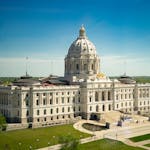As Yom Hashoah, Holocaust Remembrance Day, approaches, the past and present merge …
Back in 1957, our neighbor Henry helped me overcome my terror of drowning by cradling me in his arms in the lake water and promising not to let go. It worked. Conquering my fear of a watery death might have made me jubilant. But not so, because while Henry swathed me in his burly arms, I was completely transfixed by the peculiar and unexplainably scary blue numbers tattooed near his wrist.
When I asked my father what were they for, he replied that "something bad happened to Henry once," which meant, "Don't ask any more questions. Ever." So I didn't, and over the decades the memory of those numbers faded — until the night before I entered Auschwitz.
More about that later.
Meanwhile, one day in 1964, I rushed home from school earlier than usual (eager to play my first Beatles record) and came upon Grandma Ida sitting, where she often did, on the edge of her bed. This time, she wasn't mending our socks and humming her songs; she was staring out the window, tears flowing. When I asked our normally stoic grandmother what was the matter, she waved me off harshly with the back of her hand, and without turning my way moaned in Yiddish, "Gehn avek" ("Get out of here").
Followed by an awful silence.
In her lifetime with us, Grandma Ida divulged almost nothing about her past to anyone, including her daughter — my mother — who in turn was unable (and maybe unwilling) to tell my sister and me much — except the one time when she took us aside after I had witnessed Grandma's anguish. She explained in a hushed voice that "Grandma gets very sad when she thinks about her brothers and sisters and her own mama and papa in Poland …" All of whom, Mom assumed, were shot — or worse — sometime after Grandma had acted on a nagging premonition by packing a steamer trunk, kissing her family goodbye and fleeing to America, alone.
But my mother didn't know any of this for sure; Grandma Ida grieved but didn't tell.
Then one day in 1969, Anita, mother of my best friend, Billie, stormed from her front door, threatening me with a rolling pin and worse when I drove up in my newly purchased German-made car. "Dis is v'at you vil' do," she seethed. "You vil' take dis car from here and never come back with it. Do you understand v'at I tell you? Gehn avek!"
Her eyes welled with furious, miserable tears. Until then, Billie had never confided to anyone that his parents were Holocaust survivors. They had ordered him not to.
When I was 28, in 1980, Amanda, one of my students, at the conclusion of our class reading of "Night," Elie Wiesel's jarring autobiographical novel about the Holocaust, posed a question to our class: "Do you think this could ever happen again?"
Vithu, her Cambodian classmate, replied, "It did."
Stunned silence.
More recently, in the hotel bar in Warsaw, Poland, on the night before my visit to Auschwitz-Birkenau concentration camp, I overheard a boorish American woman flirting with a man. "Daniel" told her that he was living in Jerusalem but that he had been raised in Minneapolis. Small world, I chuckled to myself.
When Daniel said good night to the disappointed woman, I followed him into the elevator, apologized for my intrusion and gushed something like, "How crazy is this? Can you believe it? I'm from Minneapolis, too. I'm traveling tomorrow to Auschwitz." I went on to reveal the dread but urgency I was feeling to actually set foot there, that I've had a lifelong near-obsession to fathom Auschwitz's terrible reality and to understand why some survivors I knew refused to share what happened to them. On and on I chattered. Suddenly, I sensed my own self-indulgence and stopped.
Daniel nodded grimly. His said that his uncle Henry was a Holocaust survivor and that he had just passed away back in Minnesota, taking "his own nightmares locked up to his grave."
"Maybe you knew him?" Daniel asked. Stunned silence again.
I've thought about Henry often over the years. And now, only hours before I entered the most obscene killing place the world has known (a moment I've visualized a thousand times), about to stand where millions like him, Anita and relatives I never knew were reduced to a shaved head and a tattoo, I was shoulder-to-shoulder with Henry's nephew, thousands of miles from our homes, in an elevator in Poland, unable to explain how and why moments like this happen.
They just do.
The next day, standing on the worn but still eerily intact steps leading into the bombed-out ruins of a gas chamber, I recited the Mourner's Kaddish (the prayer for the dead) for the 6 million killed in the Holocaust, for the millions killed in every other genocide and for the victims who survived but lived their days drowning in muted memories.
On Yom Hashoa this Wednesday and Thursday, I will recite the Mourner's Kaddish for all of them again.
Dick Schwartz is a retired teacher in Minneapolis.





